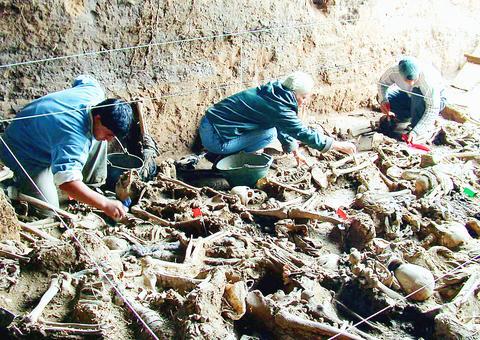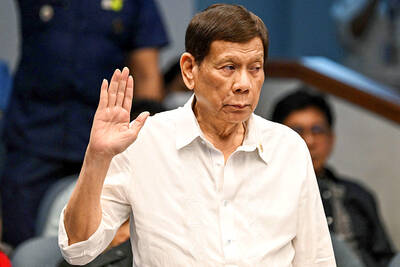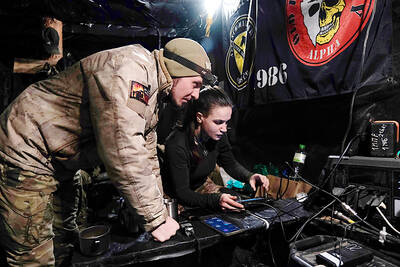In a dank mortuary, forensic anthropologist Dario Olmo pores over a carefully laid-out skeleton, piecing together the horrors of Argentina's recent past bone by bone.
Beside ribs stained brown with mud and age sits a tangle of stocking and nylon cord -- the sinister key to the man's fate at the hands of the brutal 1976-83 military dictatorship.
"This man had something around his neck that strangled him. The savagery is inexplicable," said Olmo, striving to identify dozens of the junta's victims recovered from a secret mass grave in Cordoba, 800km northwest of Buenos Aires -- the biggest found to date.

PHOTO: REUTERS
As the Argentine Forensic Anthropologists Team unearths the truth two decades after military rule collapsed, those responsible for the cruelty may now finally face justice.
Long shielded by Argentine amnesty laws, hundreds of ageing former military officers could lose their immunity and face possible extradition to stand trial abroad for the kidnapping, torture and murder of 10,000 to 30,000 people -- mostly suspected leftists -- who "disappeared" under the junta.
New left-leaning President Nestor Kirchner, himself persecuted as a student, wants to see those who he says "decimated" his generation held accountable.
"Reconciliation cannot arise from silence or complicity," he warned military top brass this month. "We must separate the wheat from the chaff, each taking responsibility for his actions."
A top Foreign Ministry source said Kirchner is seeking to annul a decree that bans extradition of ex-military accused of rights abuses -- and so pave the way for them to be tried abroad.
The initiative follows Mexico's recent extradition of former Argentine navy officer Ricardo Cavallo to Spain to face genocide and terrorism charges in what was hailed as a watershed for human rights.
Crusading Spanish judge Baltasar Garzon, who has sought the extradition of dozens of former Argentine officials, is now trying to freeze the assets of 96 ex-soldiers and police officers he accuses of dictatorship-era crimes.
Former Chilean dictator Augusto Pinochet's escape from extradition for rights crimes stemming from his own iron-fisted 1973-90 rule has not deterred relatives of Argentina's disappeared in their campaign to bring the guilty to justice.
"Kirchner's initiative is very welcome; it is a breath of fresh air," said Aida Sarti of the Mothers of the Plaza de Mayo, which groups parents whose children disappeared. "But we want the amnesty laws annulled too so the [accused] can be put on trial here."
In recent months courts have declared the so-called 1987 Full Stop and Due Obedience laws unconstitutional, and the Supreme Court is expected to take up the issue.
Judges convicted a number of high-ranking military officials after the dictatorship fell.
Coup leader Jorge Videla lives under house arrest, while ex-navy head Emilio Eduardo Massera, who ran an infamous torture center, is ailing and bedridden. Former General Leopoldo Galtieri, who led Argentina into the disastrous Falklands War, died this year.
But many officers were later pardoned, and the frustration of families who want to know what really happened is palpable. They still hold out hope of recovering a body to mourn.
Protesters this month waved banners reading "Justice and punishment for the genocidal" at a soccer match to celebrate the 25th anniversary of Argentina's 1978 World Cup win.
Back at the mortuary, the forensic anthropologists are resorting to similar tests to identify the dead, gluing together skulls shattered by bullets and studying dental records for clues.
Standing beside the gaping mass grave in a cemetery on the outskirts of this provincial capital, where around 40 suspected disappeared were tossed along with hospital waste and rubbish, Olmo is fighting against the odds.
His team, which helped find the remains of Marxist revolutionary Che Guevara in Bolivia, has recovered the remains of hundreds of Argentine disappeared over the years and has identified around 100.
"There are plenty of remains that will never be recovered," he said. "Thousands."

FEROCIOUS FISH-EATER Scientists have found a new species of dinosaur from the Cretaceous Period, a ‘hell heron’ that stalked the rivers, deep in the Saharan desert At a remote Sahara desert site in Niger, scientists have unearthed fossils of a new species of Spinosaurus, among the biggest of the meat-eating dinosaurs, notable for its large blade-shaped head crest and jaws bearing interlocking teeth for snaring fish. It prowled a forested inland environment and strode into rivers to catch sizable fish like a modern-day wading bird — a “hell heron,” as one of the researchers put it, considering it was about 12 meters long and weighed 5-7 tons. The dinosaur presented a striking profile on the Cretaceous Period landscape of Africa some 95 million years ago as it hunted

THE TRAGEDY OF PUNCH: Footage of the seven-month-old Japanese macaque has gone viral online after he was rejected by his mother and formed a bond with a soft toy A baby monkey in Japan has captured hearts around the world after videos of him being bullied by other monkeys and rejected by his mother went viral last week. Punch, a Japanese macaque, was born in July last year at Ichikawa City Zoo. He has drawn international attention after zookeepers gave him a stuffed orangutan toy after he was abandoned by his mother. Without maternal guidance to help him integrate, Punch has turned to the toy for comfort. He has been filmed multiple times being dragged and chased by older Japanese macaques inside the enclosure. Early clips showed him wandering alone with

DRUG WAR: The former president said there was no campaign to kill addicts, but his speeches called for violence and told police to use lethal force if necessary Former Philippine president Rodrigo Duterte earned global infamy for the deadly drug crackdown that led to his arrest over crimes against humanity charges, despite his huge popularity at home. A profane-lipped populist and self-professed killer, Duterte’s anti-crime campaign resulted in the deaths of thousands of alleged dealers and addicts. Rights groups said many of those killed were poor men, often without any proof they were linked to drugs. Yet, while drawing condemnation abroad, tens of millions of Filipinos backed his swift brand of justice — even as he joked about rape in his rambling speeches, locked up his critics and failed to

GAME CHANGER The Russian invasion of Ukraine has shown the utility of small drones for recon, for supporting logistics and for killing across the modern battlefield Five European nations have announced a new program to produce low-cost air defense systems and autonomous drones using Ukrainian expertise, hard-won over the past four years fighting against Russia. Friday’s initiative of the five nations — France, Poland, Germany, the UK and Italy — comes as one of many European efforts to bolster defense along their borders, like a “drone wall ” with Russia and Ukraine to better detect, track and intercept drones violating Europe’s airspace. Both Moscow and Kyiv have cutting-edge drone warfare capabilities forged in the grim laboratory of war where battlefield innovations have rewritten modern battle tactics. Poland is